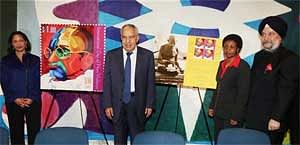Arab leaders feel Gandhian way vital to address conflicts

The observations were made during a conference held at the Arab League Headquarters here Sunday by the Indian embassy on the occasion of 140th birth anniversary of Mahatma Gandhi, which is celebrated as UN International Day of Non-violence.
The Arab leaders reached the conclusion that the experiment of Mahatma Gandhi needs to be revisited to address the conflicts of today's world.
In his opening remarks, Indian Ambassador to Egypt R Swaminathan said: "Gandhi is a symbol of a person who was able to achieve independence for India as a result of his pacifist approach which drew the attention of the world."
League Secretary General Amr Musa said: "Gandhi supported Palestinians and their rights. He also supported us here in Egypt. He enjoyed strong relations with the Egyptian leader Sa'ad Zaghloul, the leader of the 1919 revolution against British occupation."
The attendees also touched on the ancient strong ties between Egypt and the Arab world on one side and India on the other and the meeting points of both these civilisations on the cultural, political and economic points.
Former Egyptian Foreign Minister Ahmad Mahir, who attended the discussions along with academics, ambassadors and Asian, European and African diplomats, noted that the only way to honour Mahatma Gandhi is to implement his philosophy.
"The international system has quivered, and double standards now prevail. Gandhi, we dream of the world you dreamt of and called for," he said.
Head of Al-Ahram Abdel Amoniem Said noted that Gandhi had an important vision about the nature of conflict between the third world and the occupier.
"Gandhi made up for the superiority of the Western civilisation by moral superiority."
Said went on to note how Gandhi implied to the Indians the possibility of being satisfied with themselves and not feeling any inferiority and this was the main trigger of India's modern renaissance.
Parliamentarian Munir Fakhri Abdel Nur spoke about Gandhi's stop in Egypt on his way to the 1931 round table conference in London and Egyptian's warm reception.
He recalled that Egyptians asked the Mahatma to write a memo to support them in the face of then autocratic government not realising it was one of Gandhi's days to abstain from food and speech.
"Gandhi asked for a sheet of paper and wrote one word 'boycott' which had a magical effect in inspiring the Egyptians to hold an uprise against British occupiers peacefully," Abdel Nur said.
The activities ended with a photo exhibition entitled 'Gandhi: His life and His message' which included photos of Gandhi, his family and important points of his political and personal life.
Deccan Herald is on WhatsApp Channels| Join now for Breaking News & Editor's Picks